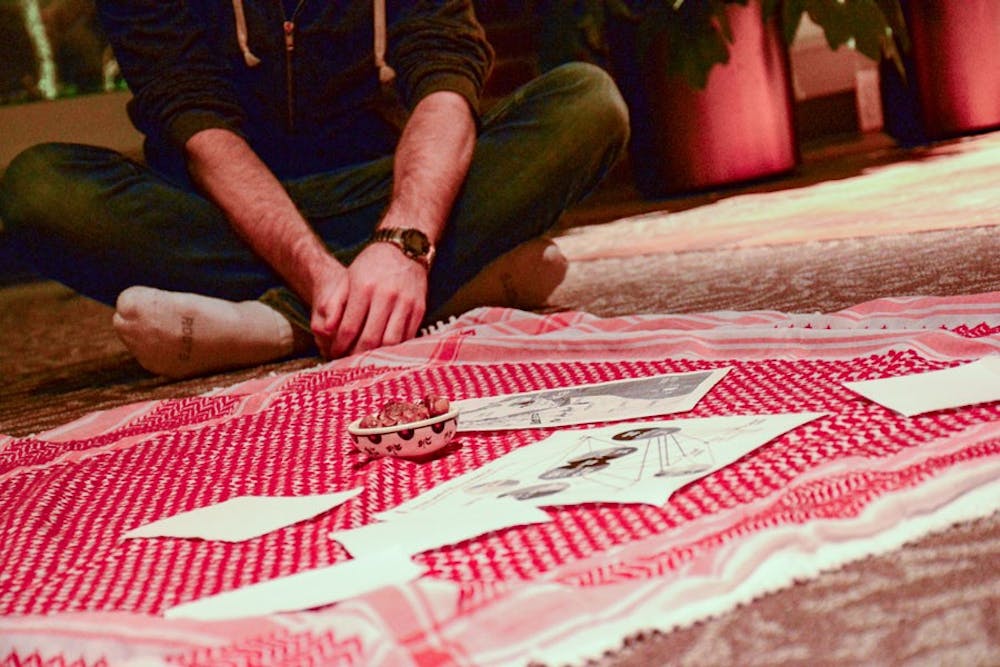By Katherine Yeager | Echo
Every Wednesday from 9-10 p.m., a group of students meet in the Memorial Prayer Chapel to pray for a different nation in the Middle East. The group was formed this semester by sophomore Abigail Roberts who leads the group in a time of learning, worship, prayer and intercession.
A red and white Keffieh-a traditional Jordanian Bedouin scarf-is sprawled across the carpet. The scarf is symbolic of national pride in Jordan, the nation where Roberts spent her high school years. Prior to living in Jordan, Roberts grew up in Syria, the home she left when she was 12. Roberts believes prayer connects her to the people and beauty of Syria-a place to which she hopes to return someday.
When Roberts thought of attending college, she knew her primary goal: to start a Middle East prayer group. She wanted to emphasize the importance of prayer and worship she saw in her parent's faith and emulate a similar Middle East prayer group started by a friend at Moody Bible Institute. After spending a semester in Taylor's Irish Studies Program last fall and serving with Youth With a Mission (YWAM) in Nepal last spring, Roberts arrived for her first semester on campus and launched the group a month and a half ago.
"I love creative prayer," Roberts said. One week when the group prayed for the persecuted church in Egypt, they emulated the setting of the persecuted church with a dark room and hushed tones. Sometimes the group partakes in communion, creates art based off of prayers or eat Middle Eastern food like dates.
During this Wednesday's prayer group, the focus was Tunisia. On the Keffieh, Roberts set a small dish of dates, a worn leather Bible, a map of the Middle East, several drawings and various papers, one with the word "Tunisia" handwritten at the top.
Throughout the meeting, as Roberts heard what she believed to be "prayers of power," she wrote them on the sheet. She encouraged group members to pray in full faith that what they pray will happen.
Roberts turned on an Arabic worship song which she explained is about giving everything up to God. She sees worship as a time to refocus. She then described the historical, cultural and religious context of Tunisia, the nation that began the Arab Spring in 2010. The focus for prayer became church persecution, Tunisian pastors and youth.

Three students, including Roberts, gathered around the Keffieh to pray. Junior Joseph Mosse grew up as a missionary kid (MK) in Ukraine and will be spending part of his summer living in Lebanon. Senior Daniel Ford, an MK who grew up in Hungary and Kazakhstan, has a passion for both film and stories, especially those he has heard from the Middle East.
Mosse and Ford, the respective president and vice president of Mu Kappa, a campus fellowship for MKs. This year, several members of the group are from the Middle East, including Roberts. Mosse, who has long held an interest in the Middle East, sees the group as a small yet tangible way to transition from learning and discussing about the Middle East to moving toward action and involvement.
"I'm glad that we have opportunities like the refugee simulations, speakers (who) come to talk about conflict in the Middle East and missionaries who talk about the church and the gospel in the Middle East, but it often feels like the response of our campus stops there," Mosse said.
Mosse is encouraged by the Middle East prayer group's ability to recognize other students' interest in moving beyond on campus who want to move beyond conversations and toward a commitment to pray. Mosse believes the power of prayer cannot be underestimated and hopes more people will attend the prayer group and begin to find ways to reach out to Muslims and engage in action.
Ford believes in the importance of prayer and sees a lack of it on campus. He sees the prayer group as an opportunity for growth.
"There is so much oppression and injustice in the Middle East, and it is in desperate need of the gospel and the Spirit of God," Ford said. "I believe that when we get together to pray, God moves and works."
The group is open to all students, and Roberts encourages others to pray for hope for the Syrian people. She hopes that the Syrian people who were dispersed will be able to return home one day and rebuild the nation.
Roberts encourages students to learn more about the persecuted church in the Middle East. Christians only comprise 3-4 percent of the Middle East, a steep drop from 20 percent 100 years ago due to a variety of factors such as Islamic extremism to blasphemy laws according to the Berggruen Institute.
In the back of the Memorial Prayer Chapel is a table with various resources used by the group including a tri-fold board with more information. Roberts welcomes anyone to use the resources for prayer when they visit the prayer chapel.





